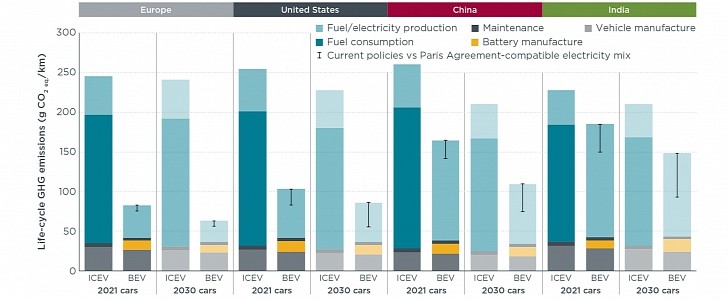The efforts of unprepared automakers to present EVs as more pollutant than ICE cars are not new. What is surprising is that they are so enduring despite all the evidence to debunk them. ICCT (International Council on Clean Transportation) conducted a new study about GHG (greenhouse gas) emissions and proved – once again – that electric cars are cleaner than the ones with combustion engines even if charged by the most pollutant thermal powerplants.
The study does not mention that, but the explanation for this is efficiency. Electric motors convert about 90% of the energy they get either from batteries or fuel cells into movement. The best combustion engines around achieve a 40% efficiency, which is equivalent to saying 60% of what you pay for fuel turns into heat, CO2, particulates, and other pollutant elements.
Even if EVs start their lives with more CO2 emissions due to battery manufacturing, that difference is quickly compensated and eventually beaten by ICE cars throughout their lifecycles. In other words, they may start emitting less GHG, but that advantage ends quickly.
According to the study, only BEVs (battery electric vehicles) and FCEVs (fuel cell electric vehicles) are capable of meeting the targets for the Climate Agreement until 2050. Their emissions are lower than those of gasoline cars in the four main geographic areas ICCT decided to measure: China, the U.S., Europe, and India.
The paper revealed that BEVs and FCEVs are 66% to 69% cleaner than gasoline-powered cars in Europe. That efficiency is gradually reduced for vehicles sold in the US (60% to 68%), China (37% to 45%), and China (19% to 34%) due to these countries’ electricity mix. However, they are cleaner in all cases than its competitors with combustion engines – any of them. If they were powered solely by renewable energy, their advantage would be of 81%.
The study showed that cars powered by gasoline or diesel engines have very similar GHG emissions during their lifecycles. It also showed that vehicles that burn CNG (compressed natural gas) can exceed the emissions of gas and diesel cars. They are currently presented as an eco-friendly solution.
If you are asking about PHEVs (plug-in hybrid electric vehicles) and HEVs (hybrid electric vehicles), they just don’t make the cut. Some automakers still defend them as a safe and sound solution for the industry to prepare for the electric shift.
The ICCT study shows that HEVs are only 20% cleaner than cars that only have combustion engines. When it comes to PHEVs, they are 42% to 46% cleaner in the US, 25% to 27% in Europe, and 6% to 12% in China.
The study has 81 pages (86 counting the cover and other parts in the PDF file) and you can read it in full here or on the ICCT page. Just make sure you do not repeat the fallacious argument that EVs can be dirtier than combustion-engined cars: people may think you also believe in a flat Earth or are an anti-vaxxer.
Even if EVs start their lives with more CO2 emissions due to battery manufacturing, that difference is quickly compensated and eventually beaten by ICE cars throughout their lifecycles. In other words, they may start emitting less GHG, but that advantage ends quickly.
According to the study, only BEVs (battery electric vehicles) and FCEVs (fuel cell electric vehicles) are capable of meeting the targets for the Climate Agreement until 2050. Their emissions are lower than those of gasoline cars in the four main geographic areas ICCT decided to measure: China, the U.S., Europe, and India.
The paper revealed that BEVs and FCEVs are 66% to 69% cleaner than gasoline-powered cars in Europe. That efficiency is gradually reduced for vehicles sold in the US (60% to 68%), China (37% to 45%), and China (19% to 34%) due to these countries’ electricity mix. However, they are cleaner in all cases than its competitors with combustion engines – any of them. If they were powered solely by renewable energy, their advantage would be of 81%.
The study showed that cars powered by gasoline or diesel engines have very similar GHG emissions during their lifecycles. It also showed that vehicles that burn CNG (compressed natural gas) can exceed the emissions of gas and diesel cars. They are currently presented as an eco-friendly solution.
If you are asking about PHEVs (plug-in hybrid electric vehicles) and HEVs (hybrid electric vehicles), they just don’t make the cut. Some automakers still defend them as a safe and sound solution for the industry to prepare for the electric shift.
The ICCT study shows that HEVs are only 20% cleaner than cars that only have combustion engines. When it comes to PHEVs, they are 42% to 46% cleaner in the US, 25% to 27% in Europe, and 6% to 12% in China.
The study has 81 pages (86 counting the cover and other parts in the PDF file) and you can read it in full here or on the ICCT page. Just make sure you do not repeat the fallacious argument that EVs can be dirtier than combustion-engined cars: people may think you also believe in a flat Earth or are an anti-vaxxer.







